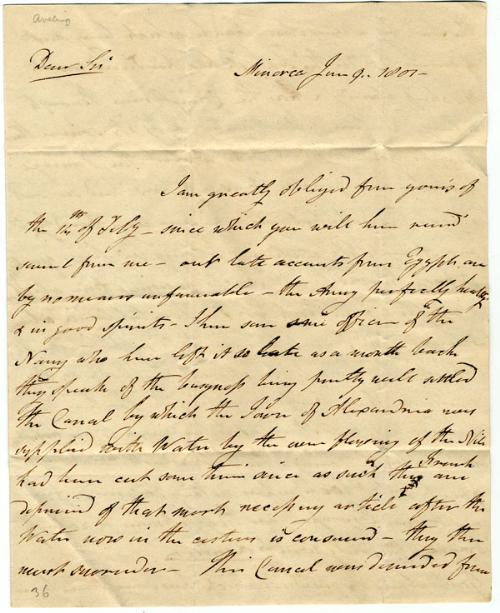Egypt in the Napoleonic War

[ref.M10/5/36]
Letter from George T. Aveling, Minorca to the Rev E Williamson, Campton.
9 Jan. 1801
"I am greatly obliged for yours of the 14th of July since which you will have received several from me - our late accounts from Egypt are by no means unfavourable - the Army perfectly healthy & in good spirits - I have seen some officers of the Navy who have left it so late as a month back they speak of the business being pretty well settled the canal by which the Town of Alexandria was supplied with Water by the new flowing of the Nile had been cut some time since as such the French are deprived of that much necessary article after the water now in the cistern is consumed - they then must surrender. This Canal was divided from the sea by a very strong bank which being cut of course lets in the sea - it has produced much mischief already as the Canal run through a large portion of the Country & by its source the people was supplied with water the damage must be very great it as yet has had no bad effect the inhabitants who are very friendly to our Army still continuing to bring in large quantities of fresh provisions - fowls uncommon fine at 1/6 a couple fine sheep at 5s/- vegetables in abundance. The French who are well supplied chiefly submit upon camels by choice - they look with confidence for reinforcements. The position they now occupy is so strong as to be next to an impossibility to convey - the loss would be very great but I look upon nothing too great from our brave troops - an Englishman is naturaly brave - they only want leaders.'
Why is this document at Bedfordshire & Luton Archives?
Edmund Williamson was Rector of Campton from 1790 to 1839. His wife Mary was the aunt of George Tipping Aveling, born 1774. G T Aveling was an army surgeon.
The Williamson collection, ref.M, deposited in 1941, includes a comprehensive collection of personal correspondence [ref.M10]. George wrote to his aunt and uncle from postings in Bremen, Sunderland, Lichfield, Preston, Menorca, Alexandria and Malta.